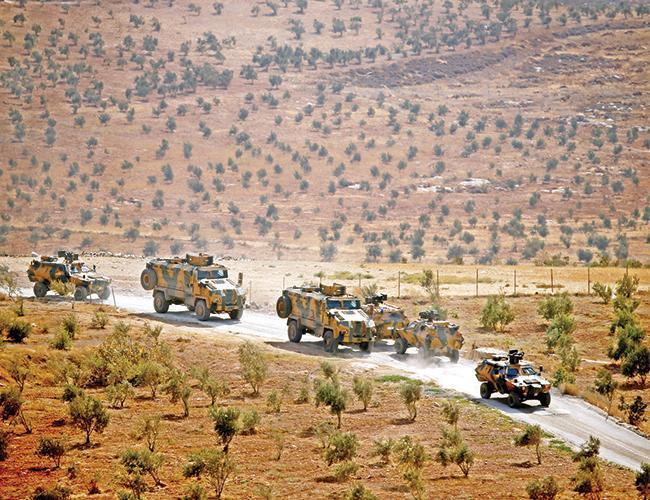
Turkey has announced the beginning of a new military operation into Idlib province in Syria as part of a deal with Russia and Iran, in an attempt to create de-escalation zones and also prevent Syrian Kurdish groups from building a “terror corridor” along the Syrian border toward the Mediterranean Sea.
The Turkish Armed Forces on early Oct. 8 shelled positions in jihadist-controlled Idlib in support of the advance of Free Syrian Army (FSA) fighters on the ground, a day after Ankara announced the start of an operation there.
Military sources said howitzers on the border fired around five shots in support of FSA fighters who had entered Idlib, which is largely controlled by Hayat Tahrir al-Sham (HTS), a former al-Qaeda affiliate that changed its name last year from the Nusra Front.
There was no official confirmation on the news that the TSK troops had entered into Syria, though some local sources claimed that minor clashes between Turkish troops and jihadist groups have already been observed.
“The [operation] process, which began yesterday and started to be implemented today, is continuing together with the Free Syrian Army without any problems,” President Recep Tayyip Erdoğan said in his address at a ruling Justice and Development Party (AKP) strategic planning camp on Oct. 8.
Security threats
Erdoğan underlined that the operation into Idlib, just like the Euphrates Shield Operation, is part of Ankara’s strategy to eliminate security threats at their source.
“When we don’t go to Syria, Syria comes to us,” he said, referring to security problems that Turkey has suffered in recent years because of the presence of the Islamic State of Iraq and the Levant (ISIL) along the border as well as three million Syrian refugees in the country.
“Let’s not fool ourselves. We should be aware of the reality. We have a 911-kilometer border with Syria. And there is very serious preliminary work in the making of a state. We were already late [in stopping this]. But if we remain silent then this will happen,” he said, referring to the Syrian Kurdish People’s Protection Units (YPG) in northern Syria. The YPG has already expanded its territories in recent years while fighting against the ISIL with support of the United States.
“We are obliged to break this terror corridor from the east toward the Mediterranean. We cannot tolerate this. Otherwise we’ll suffer from another Kobane [incident]. We don’t want that and we won’t allow it,” Erdoğan said.
In late 2014 there were widespread demonstrations in southeast Turkey against the Ankara government’s alleged passivity in the face of ISIL’s siege on the YPG-held town of Kobane.
Erdoğan also vowed that Turkey “will not allow itself to be threatened” through incidents in both Iraq and Syria, citing the Iraqi Kurdistan Regional Government’s (KRG) recent independence bid.
“Both our hearts and arms are open to those who show friendship to us. But to those who feed enmity towards us I should repeat: ‘We may come suddenly one night,’” he said, echoing a popular nationalist phrase.
Turkey cooperating with Russia
Turkey’s diplomatic moves are also continuing with the start of the Idlib operation. In his address to the AKP camp, Prime Minister Binali Yıldırım underlined that Ankara is in close cooperation with Russia during the operation and vowed to “provide security in Idlib.”
Turkey aims to prevent conflict in Syria’s northwestern Idlib, said Foreign Minister Mevlüt Çavuşoğlu late on Oct. 7.
Çavuşoğlu spoke with Iranian Foreign Minister Javad Zarif on the phone late on Oct. 7 as the other guarantor country of the Astana process.
Turkey eyes Geneva process
“Regarding Idlib we have arrived at an agreement in Astana because we want to prevent conflict in these areas through a de-conflict zone,” he said, describing Astana as a “platform for increasing confidence-building measures and ending conflict.”
“Our aim now is to revive the Geneva process,” he added.
The Geneva process is a U.N.-led international mechanism that aims to find a political solution to the long-running Syrian war.
The process aims to create a transitional government with the task of rewriting the constitution and holding elections.
During a meeting in the Kazakh capital Astana on May 4, the guarantor countries - Russia, Turkey and Iran - signed a deal to establish de-escalation zones in Syria. The three guarantor states, as well as representatives of the Damascus-based Assad regime and some opposition factions, met in Astana in September for a sixth round of talks aimed at ending the six-year conflict.
A December cease-fire in Syria brokered by the three countries led to the Astana talks, held in parallel to the U.N.-backed discussions in Geneva to find a political solution to the conflict.
Syria has been locked in a vicious civil war since 2011, when the al-Assad regime ferociously cracked down on protests. Since then, hundreds of thousands of people have been killed in the conflict, according to the U.N.